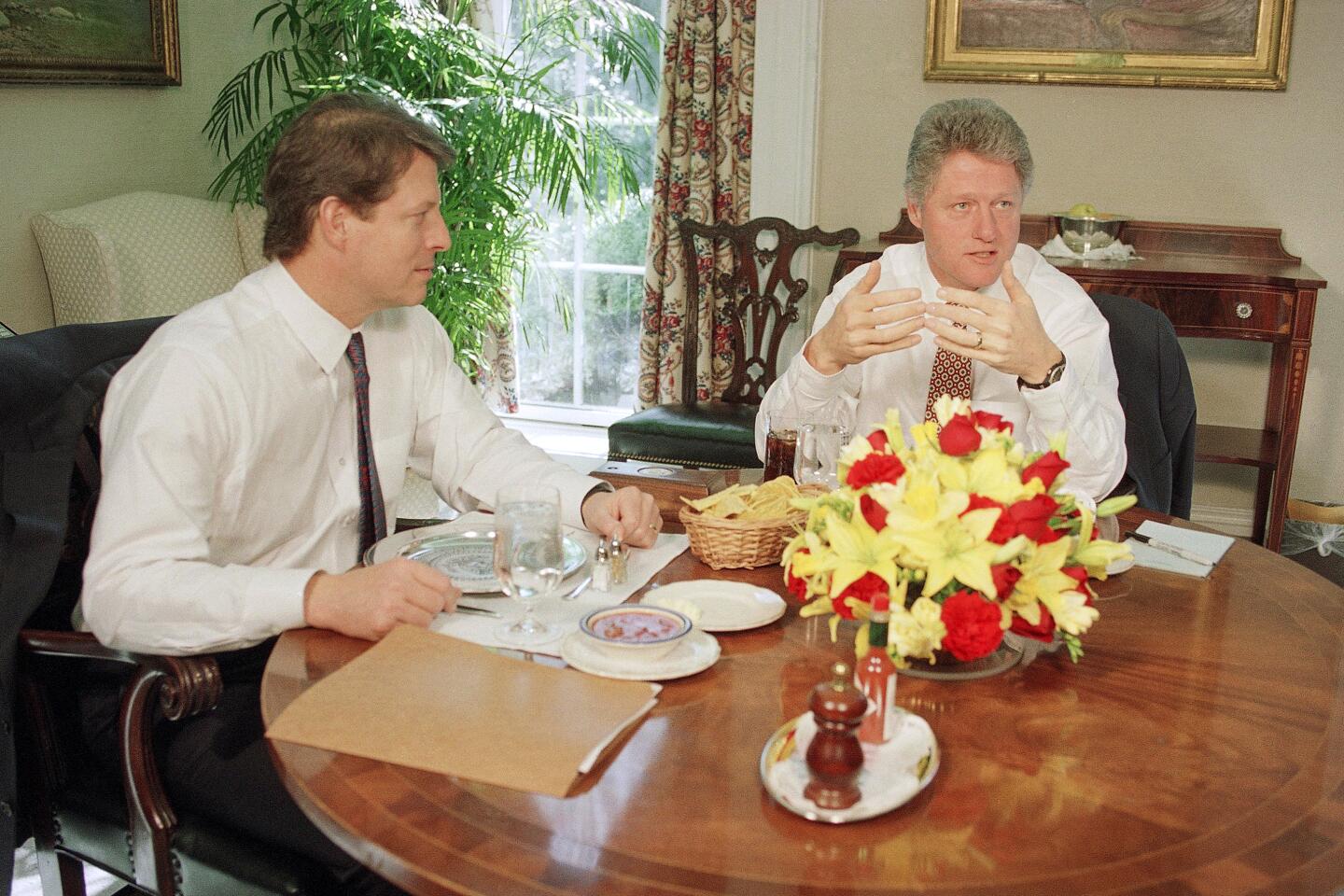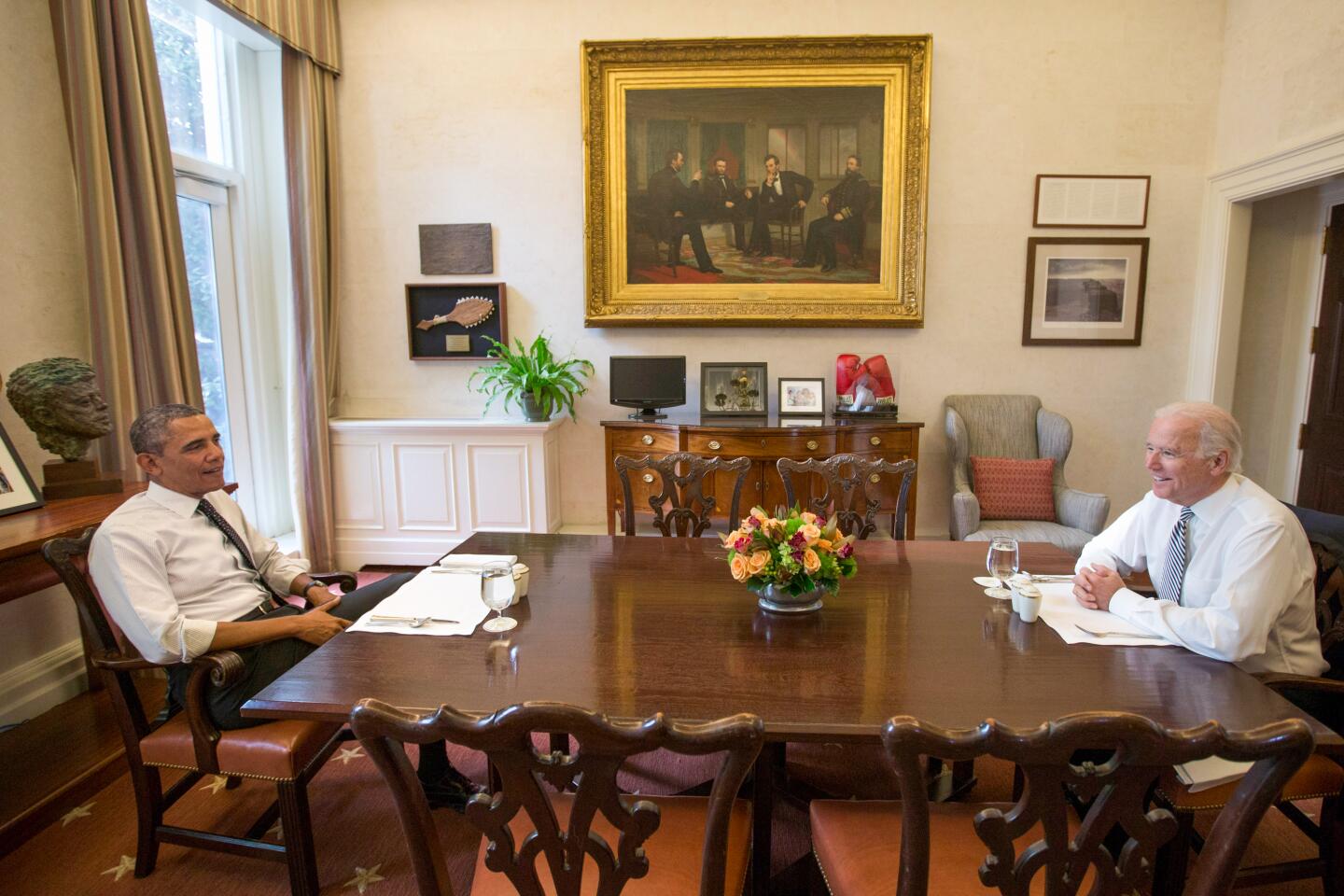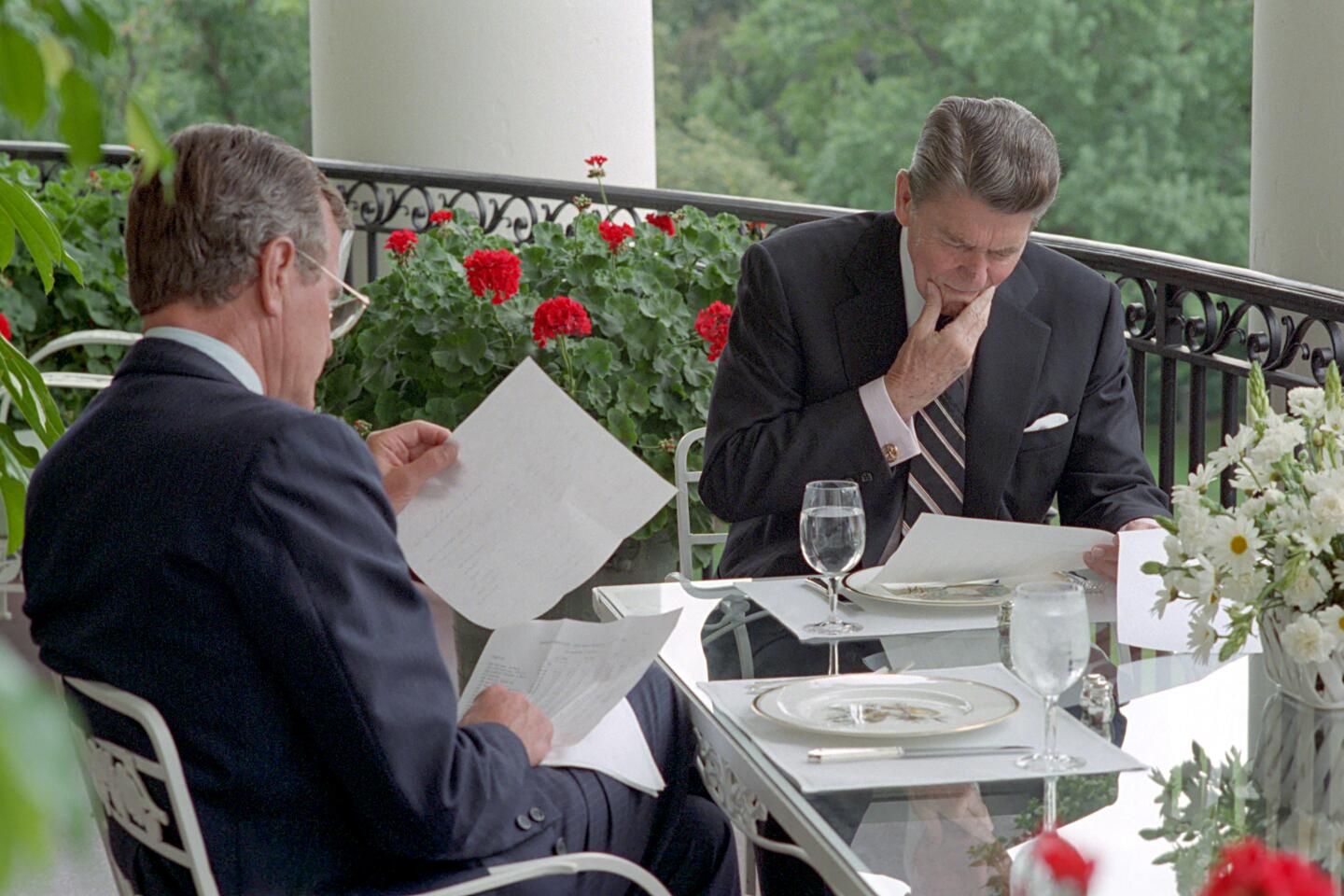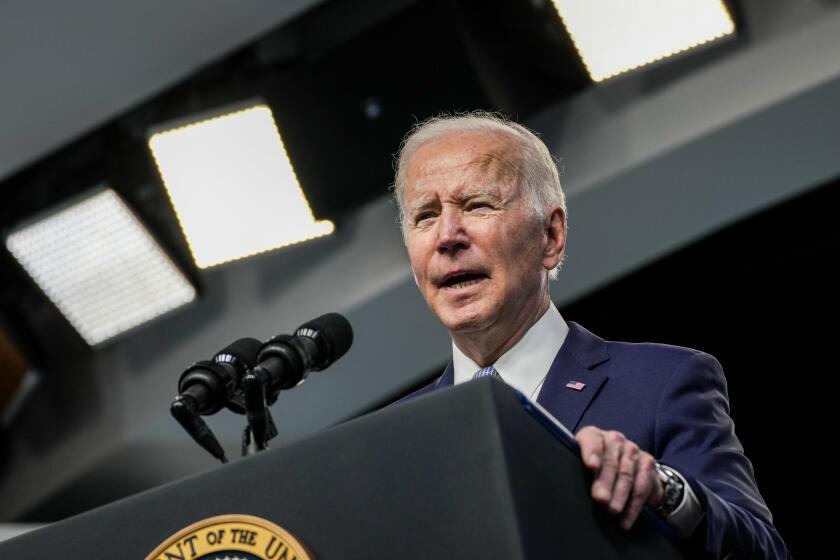Biden administration races to salvage Summit of Americas in Los Angeles
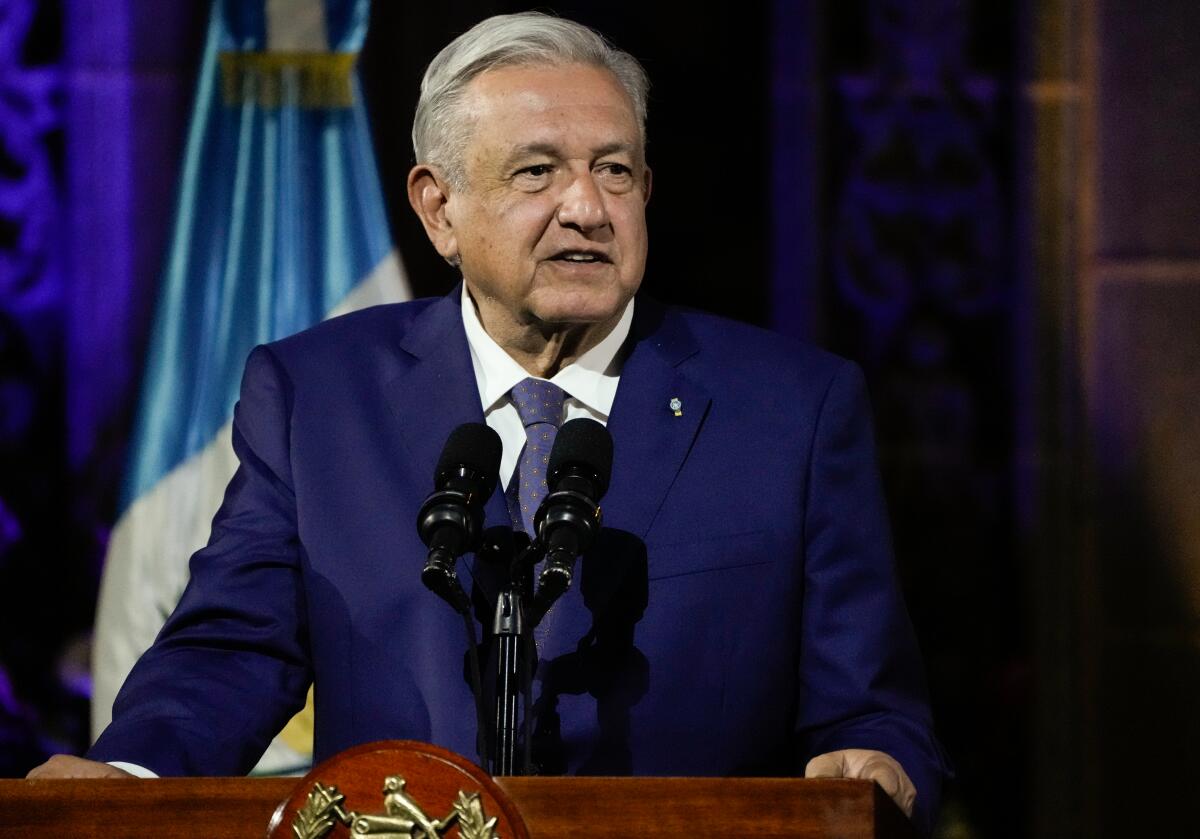
- Share via
WASHINGTON — A brewing boycott over the invitation list to this year’s Summit of the Americas, a hemispheric gathering held every three to four years and planned for Los Angeles next month, has the Biden administration scrambling to avoid an embarrassment that could erode U.S. influence in the region.
The trouble began when the administration decided initially to exclude antidemocratic leaders from Cuba, Nicaragua and Venezuela, drawing the ire of Mexican President Andrés Manuel López Obrador. The Mexican leader said he would not attend the summit unless all countries in the Western Hemisphere were included. Other Latin American leaders quickly echoed the warning.
The summit comes at a critical time for the administration, which is seeking to counter China’s growing clout in the region, repair relationships damaged during the Trump administration and stem the flow of migrants at the southern U.S. border.
“This should have been seen as an opportunity, a premier spot to roll out an aspirational vision for a Latin America plan,” said Ryan Berg, a Latin America expert at the Center for Strategic and International Studies, a Washington think tank.
Instead, he added, the summit is “in crisis” and many of the hemisphere’s leaders feel they “can threaten to defect without fear of much cost. They won’t feel they’re missing out.”
With the summit scheduled to start June 6, the White House has yet to finalize the guest list. In an effort to shore up support, it dispatched former Sen. Chris Dodd, Biden’s special advisor for the summit, to Mexico to persuade López Obrador to attend.
Before Dodd’s visit, the administration took another step that analysts say was directed at convincing leaders they should show up: It lifted some of its hard-line Trump-era restrictions on Cuba by announcing it would make it easier for families to send money to and visit the communist-ruled island and it eased some sanctions on Venezuelan oil.
The “first tranche” of invitations was sent late last week, but the administration continues to consider additional invitees, State Department spokesman Ned Price said Friday.
“We are confident that there will be robust participation,” Price said.
Another U.S. official, speaking on condition of anonymity to discuss the event, said the White House is “evaluating options on how to best incorporate the voices of the Cuban, Venezuelan and Nicaraguan people into the summit process.”
Over the weekend, Sen. Marco Rubio (R-Fla.), a hawk on Cuba who is following summit preparations, said on Twitter that the Biden administration has decided to invite the Cuban “regime.” It is possible the two governments would compromise on a lower-level official from Havana, perhaps someone from the foreign ministry. Such a move may satisfy Mexico’s objections.
The White House is also counting on the diplomatic touch of First Lady Jill Biden, who is on a six-day tour of Ecuador, Panama and Costa Rica to promote the summit. Earlier this month, the first lady conducted some diplomacy tied to the Russian invasion of Ukraine, visiting Romania and Slovakia. She made a surprise stop in Ukraine on Mother’s Day.
So far, U.S. efforts have yielded few results. The potential boycott has raised questions about the administration’s preparations and whether the region — mired in corruption and instability — has reached a turning point. Its countries are steadily electing leaders less concerned with democracy and with maintaining strong ties with Washington. Authoritarianism and populism are also on the rise in a region bedeviled by deep poverty and inequality.
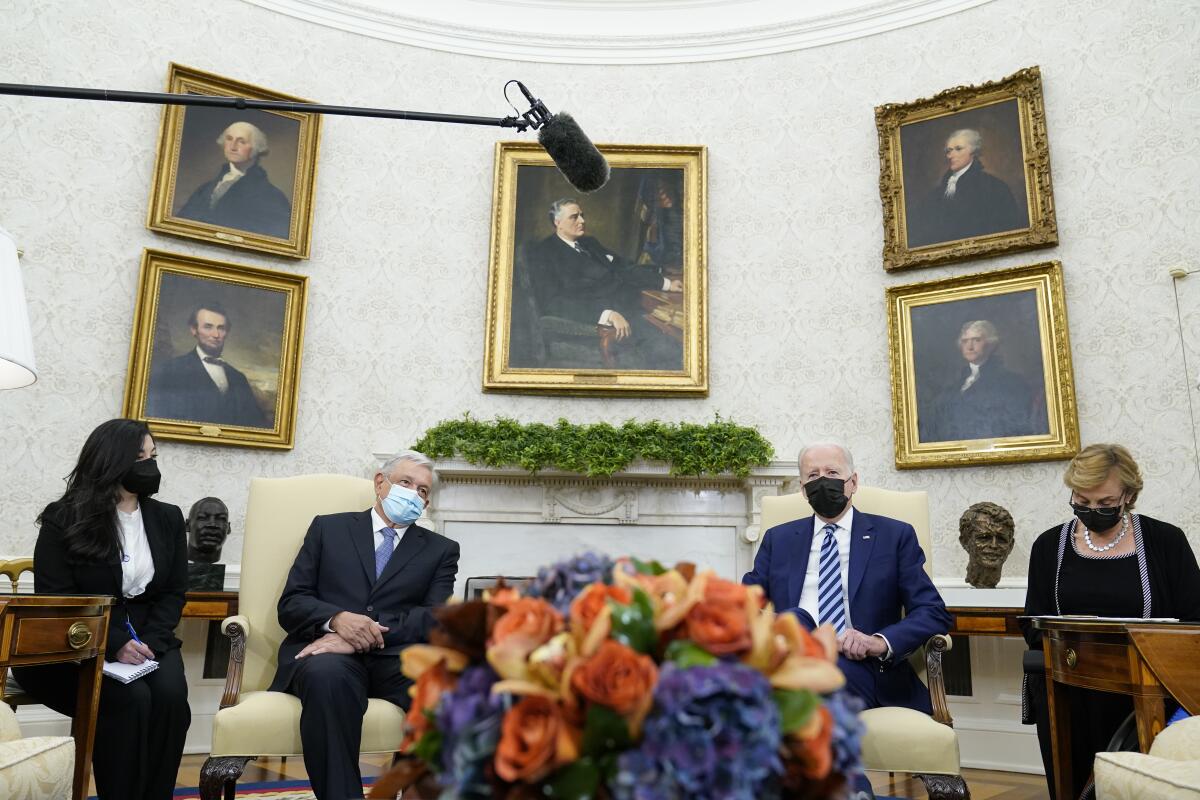
After four years in which a Trump administration largely either ignored or lashed out at countries in Latin America, many throughout the region believed Biden would push for better diplomatic relations and better trade policies, even with Cuba. As a presidential candidate, Biden had spoken glowingly about his many trips to the region and his relationships with the countries’ current and former leaders.
But the expected detente did not materialize, and many Latin American countries have begun to turn more frequently for assistance from China and other potential investors and partners.
“There is a sense of separation,” said Earl Anthony Wayne, former U.S. ambassador to Mexico and Argentina.
Beyond the economic dimension, Wayne said, “there is a souring of public views on how effective democracy is. They look and see the United States has been having some of the same problems. It’s not a shining example of success in the north.”
Seizing on that sentiment, China has made enormous inroads throughout the region. Just since 2017, 21 of the 35 countries in the hemisphere have joined China’s ambitious $4.3-trillion Belt and Road Initiative, which is building infrastructure and expanding trade deals involving raw materials and other commodities throughout the world. Leaders of Latin American countries know China will not make demands about democracy or corruption, although Beijing’s loans often come with a high financial price tag.
There has not been a major new trade deal between the U.S. and a Latin America country in several years.
The Biden administration “is bungling this,” said Berg, the Latin America expert at the Center for Strategic and International Studies. “If you’re China, you gotta be loving it.”
As the summit inches closer, the contours of the agenda appear to still be taking shape. While migration and climate change remain top priorities for Biden’s domestic agenda, the meeting is an opportunity to address broader economic and trade challenges facing Latin America as it struggles to recover from a pandemic-induced recession.
The administration has yet to release an agenda for the summit, making it difficult to gauge its potential effectiveness, according to Andrew Rudman, director of the Wilson Center’s Mexico Institute.
A more detailed road map, analysts say, might have helped ensure the upside of participating was higher than the downside of snubbing Washington.
Those who attend the summit, including corporate leaders and civil society representatives, potentially could walk away with some sort of regional consensus on migration and economic recovery in the rare moment the U.S. foreign policy apparatus is looking south, according to analysts. That could spell trouble for those who boycotted the event.
“In international diplomacy you either sit at the table or you can become part of the menu,” said Arturo Sarukhán, former Mexican ambassador to the U.S. “That is one risk, I think, Mexico and others are probably running by playing this game.”
If López Obrador, Mexico’s president, sticks to his threat to boycott the summit, it would make it difficult for the Biden administration to strike any meaningful deals stemming the flow of illegal migration at the U.S. southern border, a major domestic priority for Biden ahead of November’s midterm elections.
Other leaders have expressed frustration with the Biden administration over its decision to block certain countries from attending. Those include Bolivian President Luis Arce and Honduran President Xiomara Castro, who have suggested they will skip the summit. Several Caribbean countries have said they may not send representatives.
Guatemala’s conservative president, Alejandro Giammattei, threatened to stay home after the U.S. criticized the Central American country for reappointing an attorney general it accuses of obstructing anti-corruption investigations. So has Brazilian President Jair Bolsonaro, an avid Trump ally who is angry over the U.S. and other countries’ criticism of his handling of the depredation of the Amazon.
The periodic gathering, which hasn’t been held in the U.S. since its 1994 inaugural session in Miami, has had its share of diplomatic flare-ups and political theater. Cuba had been excluded from, or declined to attend, the summit for two decades. It returned in 2015, when a famed handshake between President Obama and Cuban leader Raul Castro seemed to set off a thawing of relations. Three years later, Trump skipped the event in a diplomatic snub, sending Vice President Mike Pence in his place.
Sarukhán, the former Mexican ambassador to the U.S., disagrees with the Biden administration’s continued hard-line policy toward Cuba. He said it gives the Cuban government an excuse to misdirect attention from its own public policy and political failings.
But Sarukhán added that the White House is taking the right approach on the summit. It should apply a democracy litmus test to be permitted to attend. He pointed to the 2001 Inter-American Democratic Charter signed by all countries in the region, except Cuba, which affirmed “the peoples of the Americas have a right to democracy and their governments have an obligation to promote and defend it.”
The bigger issue, he said, is that López Obrador publicly sandbagged Biden in a flagrant violation of the unwritten rule of the U.S.-Mexico relationship, which is “you don’t spring surprise decisions on your partner.”
Los Angeles is set to host the Summit of the Americas next month, and global politics are shaping the event’s guest list.
After Dodd’s meeting last week with López Obrador, the Mexican government said it remained firm in its position that all countries should be invited to the summit and it awaited a response from the U.S. But much of López Obrador’s protest is likely posturing and political theater, analysts say.
Although the pro-left president had a paradoxically friendly relationship with Trump, he likes to be seen as standing up to Washington. Analysts say López Obrador also knows he can leverage the U.S. government’s need for Mexico’s cooperation on immigration to win concessions on other matters.
“The real tragedy here is this is a region desperately in need of coordination and support,” said Benjamin Gedan, a former State Department official and South America director for the National Security Council. “The summit is a chance to put the U.S.’ feet to the fire and offer some meaningful alternatives to finance infrastructure and economic recovery.”
More to Read
Get the L.A. Times Politics newsletter
Deeply reported insights into legislation, politics and policy from Sacramento, Washington and beyond. In your inbox twice per week.
You may occasionally receive promotional content from the Los Angeles Times.

